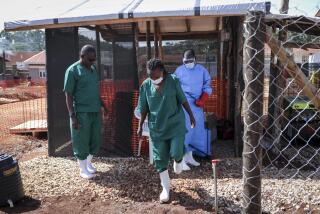Fourth American aid worker arrives in U.S. for Ebola treatment
The fourth American aid worker stricken by the Ebola virus arrived safely at Emory University Hospital in Atlanta on Tuesday as the latest figures showed that nearly 2,300 people have died in Africa in the current outbreak.
The worker, the third person with Ebola to be treated at Emory, arrived at an air base northwest of Atlanta and was taken to the hospital where the patient, clothed in an isolation suit, walked inside about 10:25 a.m.
Emory said the patient will be treated in the same isolation unit where the first two patients were treated and have since been released. Citing confidentiality rules, the hospital has not identified the current patient or described the person’s condition.
The World Health Organization said Monday it was about to evacuate a doctor, who had worked in an Ebola treatment center in Sierra Leone and tested positive for the disease. It said the doctor was in stable condition on Monday in Freetown. It is not know if the Emory patient is the same person.
Two medical missionaries who contracted Ebola in Liberia -- Dr. Kent Brantly and Nancy Writebol -- were also treated at Emory.
Another medical missionary, Dr. Rick Sacra, 51, is being treated at the Nebraska Medical Center in Omaha. Sacra’s relatives told the media Monday that he was able to eat breakfast for the first time since arriving Friday.
“He hasn’t been able to eat much since he got here, but he had some toast and applesauce,” his wife, Debbie Sacra, said. “He also tolerated the research drug well — better than he had the previous doses he was given.”
Sacra is being treated with an experimental drug that is different from Zmapp, the one given to Brantly and Writebol. Sacra’s doctors have refused to name the drug.
In its latest figures, the WHO said that 2,288 deaths from Ebola have been reported in Guinea, Liberia and Sierra Leone, the West African countries that have felt the worst of the current outbreak. The health agency also reported eight more deaths in Nigeria and Senegal, countries considered areas of localized transmission.
In all, 4,293 cases have been identified as confirmed, probable or suspected in the five countries.
WHO has estimated that 20,000 people could be infected before the current outbreak, the largest in history, is brought under control -- a process that could take six to nine months and cost $490 million.
Follow @latimesmuskal for national news.
More to Read
Sign up for Essential California
The most important California stories and recommendations in your inbox every morning.
You may occasionally receive promotional content from the Los Angeles Times.









